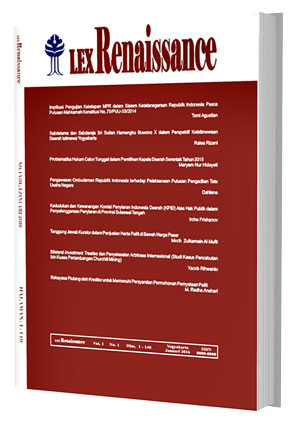Main Article Content
Abstract
Abstract
The increasing number of political parties after the reform era as the consequence of the protection of the right to freedom of association in the constitution has become a crucial issue considering that the objective of reform and constitutional amendment is to strengthen the presidential system. This is because the presidential system is considered incompatible with the multi-party system. This study aimed to analyze, first, the history of the policies to simplify the party system in Indonesia and, second, the legal politics in determining the parliamentary threshold in Law No. 7 of 2017 as an effort to simplify the party system in Indonesia. Using the normative legal research method and legislative as well as conceptual approaches, this research concluded that, first, after the reform era, several policies have been taken as an effort to simplify the political party system, including by challenging the establishment of political parties, aggravating the requirements for political parties to obtain a legal entity status, imposing more difficult terms through verification for political parties to take part in elections, implementing electoral threshold, and applying the parliamentary threshold. Second, the implementation of parliamentary threshold is deemed effective to simplify the party system in the parliament, thus making the presidential system effective. Therefore, in Law No. 7 of 2017 on General Elections, the new parliamentary threshold is set at 4% because 3.5 % in the 2014 election had yet to be able to simplify the party system in Indonesia.
Keywords: Legal politics; party system; parliamentary threshold
Abstrak
Menjamurnya partai politik pasca reformasi sebagai konsekuensi dari perlindungan hak kebebasan berserikat di dalam konstitusi menjadi isu krusial mengingat cita-cita reformasi dan amandemen konstitusi adalah memperkuat sistem presidensial. Hal ini karena sistem presidensial dianggap tidak kompatibel dengan sistem multi partai. Penelitian ini bertujuan untuk menganalisis pertama, sejarah kebijakan penyederhanaan sistem kepartaian di Indonesia; Kedua, politik hukum penentuan parliamentary threshold dalam Undang-Undang Nomor 7 Tahun 2017 sebagai upaya penyederhanaan sistem kepartaian di Indonesia. Menggunakan metode penelitian hukum normatif, serta pendekatan perundang-undangan dan pendekatan konseptual, penelitian ini menyimpulkan pertama, pasca reformasi, telah ditempuh beberapa kebijakan sebagai upaya penyederhanaan partai politik, di antaranya adalah menerapkan pemberatan pendirian partai politik; memperberat syarat bagi partai politik dalam memperoleh status badan hukum, memperberat partai politik yang akan mengikuti pemilu melalui verifikasi, menerapkan electoral threshold, dan menerapkan ambang batas parlemen (parliamentary threshold). Kedua, penerapan parliamentary threshold dianggap efektif untuk menyederhanakan sistem kepartaian di parlemen, guna mengefektifkan sistem presidensial, karena itu, melalui Undang-Undang Nomor 7 Tahun 2017 tentang Pemilihan Umum, ketentuan parliamentary threshold ditentukan angka baru sebesar 4%, karena dinilai angka 3,5% pada pemilu tahun 2014 belum mampu menyederhanakan sistem kepartaian di Indonesia.
Kata-kata Kunci: Politik hukum; sistem kepartaian; parliamentary threshold
Article Details
Authors who publish with this journal agree to the following terms:
a. Authors retain copyright and grant the journal right of first publication with the work simultaneously licensed under a Creative Commons Attribution License that allows others to share the work with an acknowledgement of the work's authorship and initial publication in this journal.
b. Authors are able to enter into separate, additional contractual arrangements for the non-exclusive distribution of the journal's published version of the work (e.g., post it to an institutional repository or publish it in a book), with an acknowledgement of its initial publication in this journal.
c. Authors are permitted and encouraged to post their work online (e.g., in institutional repositories or on their website) prior to and during the submission process, as it can lead to productive exchanges, as well as earlier and greater citation of published work (See The Effect of Open Access).



